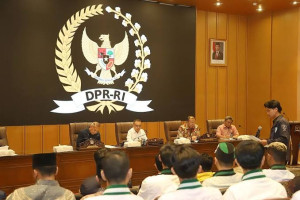Former JI leader affirms disbandment, pledges loyalty to Indonesian State
Zarkasih, the former Amir (leader) of Jemaah Islamiyah (JI), has confirmed that the organization has sincerely renounced terrorism and is aligning itself fully with the framework of the Indonesian state.
Speaking in a recent interview, Zarkasih emphasized that JI no longer functions as a terror group and has abandoned all forms of violent struggle.
"We are following the roadmap prepared by the government," Zarkasih said. "We cannot jump ahead on our own. We are integrating into the Republic of Indonesia (NKRI), and we follow its political direction and decisions." he spoke to Indonesia Business Post after a public discusion at the University of Indonesia in Jakarta on Monday, May 5, 2025.
JI is responsible for some of the most devastating terrorist attacks in Southeast Asia, particularly in Indonesia. Its campaign of violence reached international headlines in 2002 with the Bali bombings, a carefully coordinated and devastating attack that killed 202 people, most of them foreign tourists, and injured over 200 more. The attack, which involved a small initial blast followed by a massive car bomb outside the Sari Club in Kuta, was planned and executed by JI operatives such as Imam Samudra, Amrozi, Mukhlas, and aided by Noordin M. Top and Azahari Husin. This marked a turning point for regional security and sparked international counterterrorism cooperation.
Zarkasih acknowledged that global conflicts, such as the violence in Gaza, could emotionally stir some individuals, but he was firm that the group would not return to violence. “We’re not going back to that path,” he said. “There is sincerity, trust, and transparency. These three factors are key to ensuring this collaboration continues smoothly.”
He also addressed concerns about whether grassroots members share this ideological shift. According to Zarkasih, over the past six months, some 8,000 members were personally approached and engaged in discussions. “They all agreed,” he said, referring to the mass outreach and re-education efforts that followed a public declaration distancing the group from violent extremism.
Zarkasih's remarks mark one of the clearest acknowledgments from a former JI leader that the group has officially ceased operations as a terrorist entity and is committed to peaceful integration into Indonesia’s social and political fabric.
Solahudin, a terrorism expert from the Center for the Study of Terrorism and Social Conflict at the University of Indonesia (UI), said the organization no longer exists in its original form.
“There has been a fundamental transformation in ideology, organizational structure, and even in the group’s ultimate goals,” Solahudin said on Monday.
JI, which was responsible for a string of deadly bombings in the early 2000s − most infamously the 2002 Bali bombings − has gradually moved away from violent tactics and shifted toward a more political and religious proselytization agenda. This change, Solahudin noted, is not merely superficial.
“They are no longer pursuing jihad through violence,” he cited. “Their focus is now on dakwah (preaching) and social consolidation.”
This evolution, according to Solahudin, is partly a result of strategic pragmatism. Following years of sustained counterterrorism operations and the arrests of hundreds of members, the group realized that armed struggle no longer yielded results.
He emphasized that while former members may still exist and operate in various social or religious roles, the organization as a militant network has been dismantled.
“We cannot label them a terrorist group anymore if they have abandoned violent means and dissolved their jihadi command structure,” Solahudin added.
His remarks reflect a broader shift in Indonesia's counterterrorism discourse, which increasingly acknowledges ideological and organizational transformation as key indicators in evaluating threats.
Already have an account? Sign In
-
Start reading
Freemium
-
Monthly Subscription
20% OFF$29.75
$37.19/MonthCancel anytime
This offer is open to all new subscribers!
Subscribe now -
Yearly Subscription
33% OFF$228.13
$340.5/YearCancel anytime
This offer is open to all new subscribers!
Subscribe now







